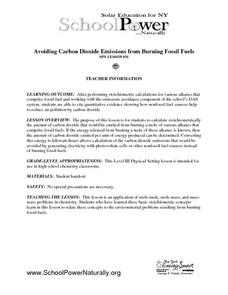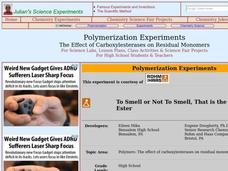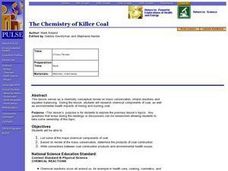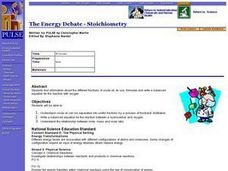Curated OER
Science with Mud!
Eighth graders give some examples of chemical reactions they see everyday. In this chemistry lesson, 8th graders investigate how much water soil can hold. They collect data and compare results with others.
Curated OER
TESI 04 Lesson Plan
Students write and balance five chemcial equations which have been observed throughout the process of completing the experiment. They use vacuum filtration to recover suspeneded particals from a colloidal suspension. Students correctly...
Curated OER
Addition Polymerization: Preparation of Polystyrene Using Two Types of Initiators
Advanced chemistry classes compare the polymerization of styrene using two different initators: benzoyl peroxide and aluminum chloride. Once they synthesize polystyrene, they compare the two producet for melting point and density. There...
Curated OER
Exposure!
Students investigate that chemicals may affect different people in different ways. They also realize that their perceptions of dangerous materials may not be realistic and that the news media may not provide all the information needed to...
Virginia Department of Education
Finding the Formula and Percent Composition
Do you have mole problems? If so, call Avogadro at 602-2140. The lesson plan starts with pupils working independently to solve for molar mass of ionic compounds. Then they learn to solve for percent composition and later perform an...
Curated OER
Water Alchemy
After reading "Aquatic Alchemy," an article about recapturing water for reuse when in space, your class will use calcium hydroxide or hydrated lime to purify cloudy water. Geared toward high school chemistry or environmental science...
Curated OER
Introduction to Toxicology
Students explore the science of toxicology and the relationship between a toxic reaction (response) and amount of substance (dose). They observe two demonstrations illustrating the concept of dose-response.
Curated OER
Avoiding Carbon Dioxide Emissions from Burning Fossil Fuels
Chemistry and earth science meet in a lesson plan on carbon dioxide emissions. After reading about atmospheric problems caused by using fossil fuels, science stars balance equations for the burning of different alkanes. They compute the...
Curated OER
Mercury in the Environment
Students develop abilities necessary to do scientific inquiry. They develop an understanding of chemical reactions, structures and properties of matter. They develop decision-making skills in natural and human-induced hazards.
Curated OER
Polymerization Experiments
Students explain the process of polymerization. For this chemistry lesson, students produce carboxylesterase in the lab. They test its effectiveness in removing the by-product odor.
Curated OER
Einstein's BIg Idea
Students discuss what the m in E=mc2 represent. They relate that mass in a chemical reaction is always conserved. Students convey that atoms rearrange themselves in chemical reactions to form different molecules and compounds.
Curated OER
A Solution for Precipitation
Students predict the product of chemical reaction using the solubility rules. In this chemistry lesson, students balance ionic equation. They perform a lab to check if their predicted products are correct.
Curated OER
Magic Genie
Learners observe the chemical change that occurs when sodium iodide is dropped into a flask containing 30% hydrogen peroxide. They discuss how this exothermic reaction occurred as they study the chemical equation involved in the reaction.
Curated OER
Household Chemistry
Young scholars use indicator paper to determine if substances are acidic, basic, or neutral. They test for Ph levels in them. They investigate the effect of oxygen on darkening fruit cut and exposed to the air. They observe vitamin C as...
Curated OER
Food Color Chemistry
Students investigate plant pigments in fruits and vegetables. In this plant pigments lesson plan, students observe the effects of pH changes on chlorophyll in one demonstration and they observe the effects pH changes on flavonoids in...
Curated OER
Electroplating for Corrosion Protection: Redox in Action
High schoolers define what a redox reaction is. In this chemistry activity, students electroplate some wires in the lab. They research the application of electroplating in the real world.
Curated OER
# 18 Determination of the Set Time for Epoxy Adhesive
Students recognize epoxy glue formation as two part polymerization (usually the curing agents act as co-monomers). They monitor the reaction by the changes in viscosity of the reacting mass, the temperature rise and fall, and the...
Curated OER
An Electro-Olympic Event: Lemon vs. Lime
Young scholars design a battery, identify and label the anode, cathode, electron flow, ion flow, oxidation & reduction reactions, chemicals used including the location of each;and distinguish between anode materials with regard to...
Curated OER
The Chemistry of Coal
Students investigate the chemistry of coal. This lesson serves as a review of conservation of mass, simple reactions and equation balancing. During the lesson, students research chemical components of coal, as well as environmental...
Curated OER
The Chemistry of Killer Coal
Students research chemical components of coal, as well as environmental health impacts of mining and burning coal. They discuss conservation of mass as it relates to combustion of organic compounds.
Curated OER
Identifying Acids and Bases
Sixth graders observe the physical and chemical change that can occur in an acid and a base. In this acids and bases lesson plan, 6th graders use cabbage juice to identify, compare, and contrast acids and bases.
Curated OER
The Energy Debate - Stoichiometry
Students determine crude oil can be separated into useful fractions by a process of fractional distillation. They write a balanced equation for the reaction between a hydrocarbon and oxygen.
Curated OER
Acids and Bases: Together again!
Students identify principles behind acid-base reactions. They predict factors that may affect an acid-base reaction. Students identify questions and concepts that guide scientific investigations.
Curated OER
Activit #2 Matter: Is It Conserved?
Students support the law of conservation of matter with evidence. They discuss the changes observed from the burning of the candle, and the differences in mass which are observed when the same reaction is carried out in an open or...

























